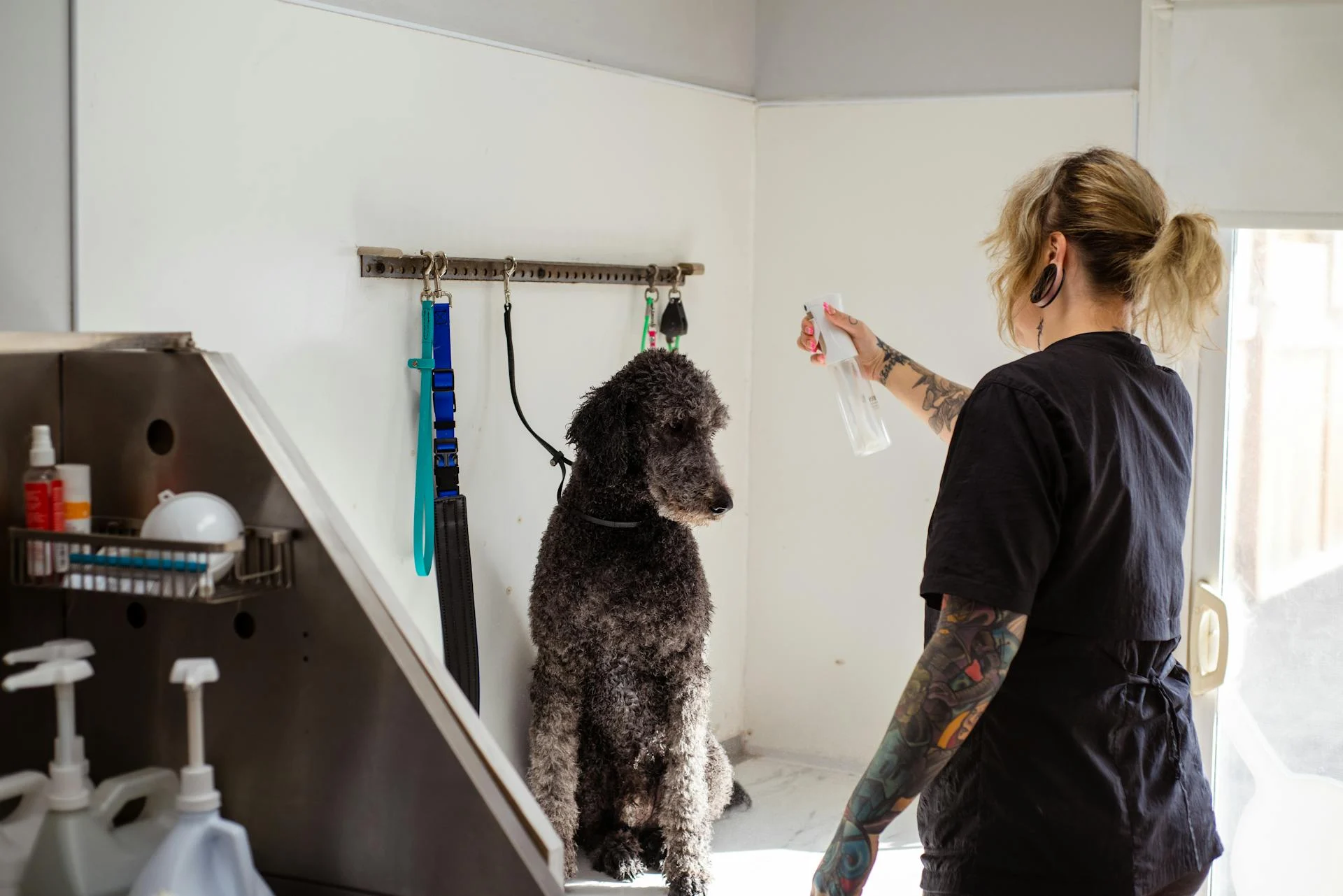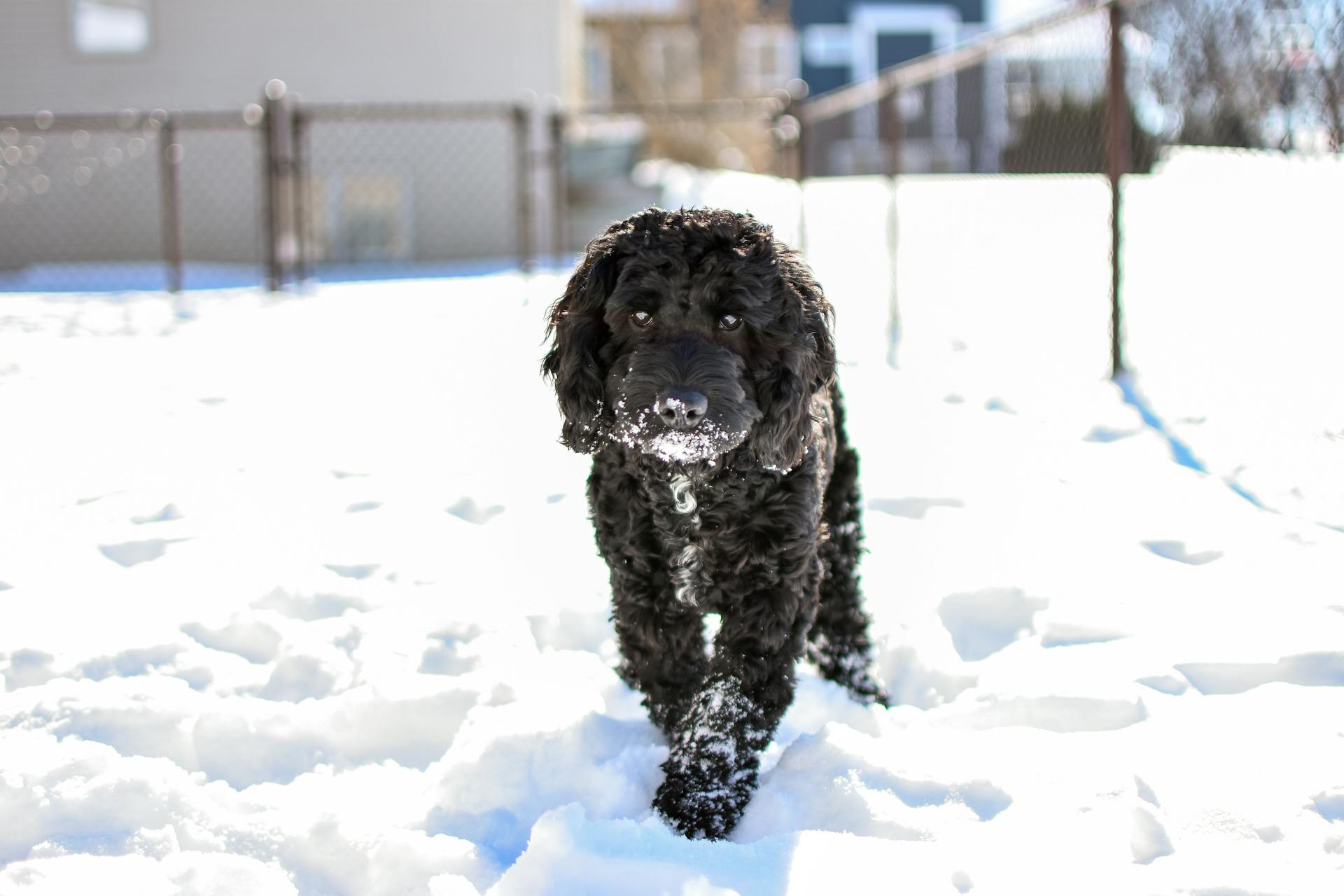
Cleaning horse brushes is important for both the health of the horse and the longevity of the brush. Here are some guidelines on how to clean horse brushes:
Tools needed:
- bucket
- soap
- old toothbrush
-vinegar
- essential oil
Instructions:
1. Fill a bucket with warm water and soap.
2. Dip the brushes in the bucket and scrub with an old toothbrush.
3. Rinse the brushes well.
4. Fill a second bucket with 1 part vinegar and 3 parts water.
5. Soak the brushes in the vinegar solution for 30 minutes.
6. Rinse the brushes well.
7. Add a few drops of essential oil to the bristles of the brush and allow to dry.
For your interest: Horse Water Trough Clean
How often should you clean your horse brushes?
Cleaning your horse brushes is important for many reasons. Not only does it help to keep your horse's coat healthy and looking its best, but it also helps to prevent the spread of bacteria and other harmful organisms. How often you need to clean your brushes will depend on how often you use them and how dirty they become.
If you are using your brushes every day, then you should aim to clean them at least once a week. If you are only using them a few times a week, then you can get away with cleaning them every two weeks or so. However, if you notice that your brushes are starting to look dirty or if they are beginning to smell, then you should clean them as soon as possible.
To clean your brushes, you will need warm water and a mild soap. Wet your brushes and then lather them up with the soap. Work the soap into the bristles, making sure to get rid of any dirt or debris. Rinse the brushes well and then allow them to air dry. It is important to not use hot water to clean your brushes as this can damage the bristles.
If you use your brushes frequently, then you may also want to invest in a brush cleaner. These cleaners help to remove any build-up of dirt and hair from the bristles and can also help to disinfect the brushes.
For your interest: How Often Should I Worm My Horse?
What is the best way to clean horse brushes?
horse brushes
There is no one definitive answer to the question of how best to clean horse brushes, as there are a variety of factors to consider including the type of brush, the frequency of cleaning, and the specific cleaning method used. However, some general tips on cleaning horse brushes can include using mild soap and water, avoiding harsh chemicals, and brushing the bristles in the opposite direction of the hair growth to ensure a thorough clean. Additionally, it is important to allow the brushes to air dry completely before using them again to avoid any potential bacteria growth.
Explore further: Types of Dog Brushes
What kind of soap should you use to clean horse brushes?
A good quality, natural bristle brush is an important tool for keeping your horse clean and comfortable. The best way to clean your horse’s brushes is to use a soap that is specifically designed for use on horse hair. There are a variety of horse shampoos and soaps on the market, and it is important to choose one that is right for your horse’s individual needs.
If your horse has sensitive skin, or if you are concerned about the possible effects of chemicals on your horse’s health, look for a natural, herbal soap. These soaps are usually made with ingredients that are beneficial for the skin, and they are often scented with essential oils.
If your horse is prone to skin infections, choose a soap that contains antimicrobial properties. Tea tree oil is a natural antiseptic that can be found in some horse shampoos and soaps.
If you are looking for a general purpose horse soap, choose one that is designed to be gentle on the skin. These soaps usually contain glycerin, which helps to moisturize the skin.
No matter what type of soap you choose, it is important to follow the directions on the package. Some soaps need to be diluted with water before they are used, while others can be used full strength. Be sure to rinse your horse’s coat thoroughly after shampooing or soapin
Curious to learn more? Check out: What Is a Tie down Used for on a Horse?
How do you remove stubborn dirt and grime from horse brushes?
The majority of horse brushes on the market are made with natural bristles, which are great for horses with sensitive skin as they are less likely to cause irritation. However, natural bristles can be more difficult to clean than synthetic bristles, as they tend to absorb more dirt and grime. In addition, horse brushes with natural bristles should be cleaned more frequently than those with synthetic bristles, as they can harbor bacteria and fungus. Here are some tips for cleaning horse brushes with natural bristles:
Soak the brush in warm water: This will help to loosen any dirt or grime that is stuck to the bristles. Add a mild soap: Use a mild soap that is designed for horse hair, such as equine shampoo. Avoid using harsh detergents, as these can damage the bristles. Gently scrub the bristles: Use a soft brush or your fingers to gently scrub the bristles. Rinse thoroughly: Rinse the brush thoroughly with warm water to remove any soap residue. Allow the brush to air dry: Do not use a hair dryer, as the heat can damage the bristles.
If your horse brush is particularly dirty or has stubborn dirt and grime, you may need to soak it in a mixture of warm water and vinegar. Vinegar is a natural disinfectant and will help to remove any bacteria or fungus that may be present. To do this, simply mix equal parts water and vinegar in a bucket or tub, and soak the brush for 30 minutes. After soaking, follow the steps above for cleaning the brush.
Here's an interesting read: Soak Hay
How do you disinfect horse brushes?
Disinfecting horse brushes is a very important part of horse care. There are a few different ways to disinfect horse brushes, and the best method may vary depending on the type of brush and the severity of the infection. Here are a few options for disinfecting horse brushes:
1. Soak the brush in a diluted bleach solution. This is a effective way to disinfect horse brushes, but it is important to make sure that the brush is fully submerged in the solution and that the solution is strong enough to kill any bacteria or viruses.
2. Use a commercial disinfectant designed specifically for horse brushes. These products are typically safe and effective, and they are designed to work on a variety of brush types.
3. Sterilize the brush using heat. This can be done by boiling the brush in water for a few minutes or by using a handheld sterilizer. This method is effective, but it is important to be careful not to damage the brush with too much heat.
4. Use a natural disinfectant like vinegar or rubbing alcohol. These products are less likely to damage the brush, but they may not be as effective as some of the other options.
5. Replace the brush. This may be the best option if the brush is severely infected or if it is not possible to properly disinfect it.
It is important to disinfect horse brushes on a regular basis to prevent the spread of infection. Whatever method you choose, make sure to follow the instructions carefully and to disinfect all of the bristles to prevent re-infection.
Worth a look: Best Brush for Bernedoodle
How do you condition horse brushes?
The process of conditioning horse brushes is relatively simple and only requires a few basic supplies. First, gather the horse brush, some water, and a small amount of soap. Wet the horse brush in the water and then add a small amount of soap to the bristles. Next, gently scrub the bristles in a circular motion to create a foamy lather. Be sure to avoid scrubbing too hard, as this can damage the bristles. Finally, rinse the horse brush thoroughly in clean water to remove any soap residue. Allow the brush to air dry or use a towel to pat it dry before using it on your horse.
Conditioning your horse brushes regularly is important to keep them in good condition and to prevent them from damaging your horse's coat. The conditioning process cleans the bristles and helps to remove any build-up of dirt, hair, or debris. It also helps to maintain the horse brush's shape and to prevent the bristles from becoming frayed or split. When conditioning horse brushes, it is important to use a mild soap and to avoid scrubbing too hard, as this can damage the bristles. Be sure to rinse the brush thoroughly after conditioning to remove any soap residue. Conditioning your horse brushes regularly will help them last longer and perform better.
How do you store horse brushes?
Horse brushes are an essential part of grooming your horse. They help to remove dirt, sweat and tangles from your horse’s coat. There are many different types of horse brushes available, so it is important to choose the right brush for your horse.
The most common type of horse brush is the body brush. Body brushes are available in a variety of materials, including natural bristles, synthetic bristles and nylon. Natural bristles are the best choice for horses with sensitive skin, as they are soft and will not scratch the skin. Synthetic bristles are more durable than natural bristles, making them a good choice for horses that are hard to brush. Nylon brushes are the most durable type of brush and are good for horses with thick coats.
Mane and tail brushes are available in both natural and synthetic bristles. Mane and tail brushes have longer bristles than body brushes, making them ideal for brushing out long manes and tails. natural bristles are softer and less likely to scratch the skin, while synthetic bristles are more durable and can remove tangles more effectively.
curry combs are another important type of horse brush. Curry combs are used to remove excess dirt and hair from the coat. Curry combs are available in a variety of materials, including plastic, metal and rubber. Plastic curry combs are the most gentle on the horse’s skin, while metal and rubber curry combs are more effective at removing dirt and hair.
Horse brushes should be stored in a dry, clean place. Brush storage containers are available in a variety of materials, including plastic, metal and wood. Plastic containers are the most affordable option, but they are not as durable as metal or wood containers. Metal and wood containers are more expensive, but they will last longer and keep your brushes in better condition.
When storing horse brushes, make sure to label each brush so you know which brush is for which purpose. This will help you keep your brushes organized and in good condition.
Expand your knowledge: Why Was the Horse so Happy?
What are some common problems with horse brushes?
There are some common problems with horse brushes that include the following:
1. Horse brushes can often be too stiff, causing the horse's coat to become matted and tangled.
2. Horse brushes can also be too soft, causing the horse's coat to become oily and dirty.
3. Horse brushes can also be too short, making it difficult to reach the horse's entire coat.
4. Horse brushes can also be too long, making it difficult to control the brush while brushing the horse.
5. Finally, horse brushes can also be made of materials that are too harsh for the horse's coat, causing the horse to become uncomfortable during the brushing process.
Additional reading: How to Build Your Horse's Topline?
How can you prevent horse brushes from getting damaged?
Horse brushes are an essential tool for grooming your horse and keeping them looking their best. However, like any other tool, they can become damaged over time if they are not properly cared for. Following these simple tips will help to prevent your horse brushes from getting damaged and extend their lifespan.
First, always store your horse brushes in a cool, dry place when they are not in use. This will help to prevent them from warping or cracking due to temperature changes or moisture.
Second, be sure to clean your horse brushes after each use. This will remove any dirt, hair, or other debris that could become embedded in the bristles and cause them to break down over time. Simply rinse the brushes in warm water and soap, then allow them to air dry.
Third, inspect your horse brushes regularly for any signs of damage. If you notice any frayed bristles or cracks in the handle, discontinue use of the brush and repair or replace it as soon as possible.
By following these simple tips, you can help to prevent horse brushes from becoming damaged and extend their lifespan. By taking good care of your grooming tools, you can ensure that your horse always looks their best.
Frequently Asked Questions
How to clean horse hair brushes?
There are a few ways to clean horse hair brushes. One option is to use a soap and water mixture. Another is to use a bristle brush cleaner made specifically for horsehair brushes.
What is a soft brush for horses?
Soft brushes are designed very similar to hard brushes, but as made obvious by their name, the bristles are much softer and more gentle on your horse’s coat. They have smaller fibers than a hard brush and are set closer together which help it to remove dirt particles and dust that is very fine.
How to clean a horse hair brush without wax?
Some people may prefer to clean their horsehair brush without using any type of wax, either because they don’t have any available or they prefer to not use any type of product on their brushes. Simply wet the bristles of the brush and run them under cool water.
How do you clean your hair brushes?
You can also use a dish soap and water mixture if you prefer, or even just an ordinary toothbrush.
Where to find a horse brush in the forest?
To find a horse brush in the forest, head to the northeast section of the forest.
Sources
- https://horsehaus.com/2021/06/14/how-to-clean-horse-brushes/
- https://www.helpfulhorsehints.com/cleaning-and-disinfecting-horse-brushes/
- https://www.youtube.com/watch
- https://suw58.com/articles/how-to-clean-horse-hair-brushes
- https://www.yourhorse.co.uk/horse-care/horse-grooming/how-often-should-i-clean-my-horses-brushes/
- https://diyseattle.com/how-often-should-you-wash-horse-brushes/
- https://thehorsehelper.com/how-to-clean-horse-brushes/
- https://horse-canada.com/magazine/grooming/hotline/
- https://zetfoundation.com/how-to-clean-horse-brushes/
- https://www.doversaddlery.com/how-to-clean-horse-brushes/a/456/
- https://www.budgetequestrian.com/how-to-clean-horse-brushes/
- https://www.quora.com/What-is-the-best-way-to-clean-horse-brushes
- https://www.luckypony.com/blog/how-to-clean-horse-brushes/
- https://www.wikihow.pet/Clean-a-Horse
- https://equusmagazine.com/horse-care/how-to-disinfect-buckets-brushes-and-other-tools-8522/
- https://equisearch.com/articles/disinfect_051905/
- https://thehorse.com/140787/how-to-clean-disinfect-horse-equipment/
- https://www.richardbealblog.com/how-to-disinfect-your-horse-stalls-clothes-brushes/
- https://www.horseforum.com/threads/disinfecting-brushes.826344/
- https://www.badgerandblade.com/forum/threads/how-do-i-prevent-horse-hair-brushes-from-tangling.496373/
- https://www.bruceonshaving.com/2010/10/04/why-horse-hair-shaving-brushes-are-not-more-common/
- https://www.badgerandblade.com/forum/threads/why-are-horse-brushes-not-as-popular.573655/
- https://www.wikihow.com/Clean-a-Horsehair-Brush
- https://wagwalking.com/horse/condition/brushing
- https://horsehaus.com/2020/01/24/5-reasons-to-use-the-best-horse-brushes/
Featured Images: pexels.com


